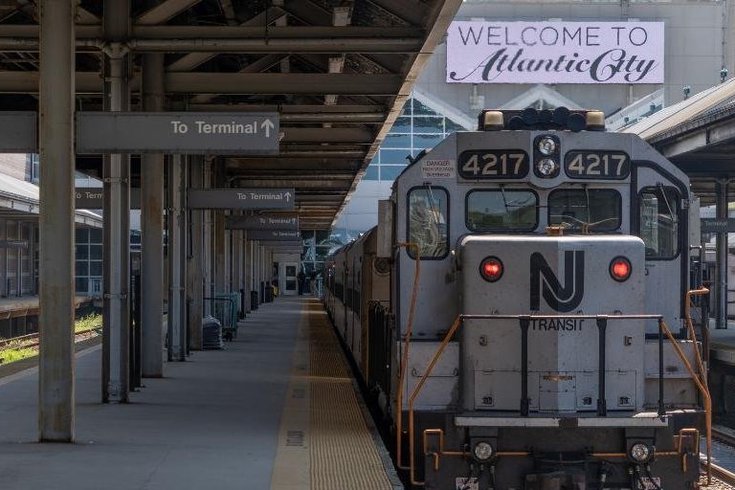
January 29, 2024
 NJTRANSIT/X
NJTRANSIT/X
A new bill would create a rider advocacy commission for NJ Transit. The proposed customer advocate office would represent the interests of public transit riders in areas such as fare increases and service decreases. Above, a train on the Atlantic City Rail Line in 2019.
One day after NJ Transit announced a proposed 15% fare hike, a state Senate committee advanced a bill that would create a transit customer advocacy commission that one lawmaker said would have given the fare increase plan much-needed scrutiny.
Sen. Raj Mukherji (D-Hudson), the bill’s sponsor, said it doesn’t send the right message to NJ Transit riders that the state doesn’t have an independent voice to represent their interests.
LATEST: Atlantic City chocolate shop sells Valentine's Day treats inspired by Taylor Swift, Travis Kelce
“We’re telling our most vulnerable citizens and all of our commuters that this isn’t a priority to us. I’m not suggesting I’m always opposed to fare hikes, but these fare hikes will not go through the analysis and need determination by someone looking out for riders,” Mukherji said.
The bill would require the creation of a rider advocacy commission that would establish an NJ Transit customer advocate office and appoint a rider advocate. The commission would be part of the state Department of Transportation and would consist of three members, one each appointed by the governor, Senate president, and Assembly speaker. The rider advocate would report directly to the commission.
Under the bill, the customer advocate office would represent the interests of NJ Transit customers in areas such as proposed fare increases, substantial decreases in services, and service expansions. The office would also be able to conduct independent investigations and studies and provide comments and feedback directly to the agency and legislators.
The bill’s supporters say it sends the right message but doesn’t go far enough. Transit advocate David Pringle urged lawmakers to implement even more independent oversight to keep tabs on the financially troubled agency. He noted NJ Transit is moving to new offices that will cost $440 million over 25 years, and he criticized the Murphy administration’s $2 billion Turnpike expansion plan, which critics say should be scuttled, with the funds used instead to expand mass transit.
“Although we’re in a less bad place in terms of management than we were under the Christie administration, the budget situation is far worse — getting increasingly worse — and unfortunately the governor is still making it worse,” said Pringle, an environmentalist with Clean Water Action.
Public transit systems across the country have struggled to make up for revenue losses tied to pandemic-era reductions in riders. Rail ridership is about 70% of what it was pre-pandemic, and bus ridership has bounced back on weekdays to 95% of pre-pandemic capacity, the Record reported in November.
If approved, the 15% fare hikes proposed Wednesday would be the first fare increases at NJ Transit in nearly 10 years. The agency also called for annual fare increases of 3% going forward. If approved, the first round of fare hikes would take effect July 1.
The proposal drew condemnation from some officials, even as they stressed that the transit agency is in need of financial support. Some lawmakers have called for the state to reinstate the corporate business tax surcharge — a tax on especially profitable businesses that expired at the end of 2023 — to help fund NJ Transit, a move Mukerji said he would support.
Nearly six years ago, lawmakers sought to increase transparency at NJ Transit through legislation that expanded the agency’s board of directors and created a new “customer advocate” position. But that position has been vacant since October 2020, and some of the more critical voices have left the board, either because their term was up or they resigned.
Mukherji said he wonders whether someone in the customer advocate position, had it not been vacant, would have been able to fight against the fare hikes, since the role reported to people within NJ Transit. Having an autonomous advocate and commission would hold the agency more accountable, he added.
The bill advanced Thursday would repeal the current customer advocate position. It also would require the rider advocacy office to hold monthly meetings with transit users and set up a website and voicemail for people to leave comments.
Mukherji said he opposes the fare hikes announced Wednesday but recognizes the necessity to fund the transit agency to avoid the fiscal cliff it faces. Based on current revenue, the agency projects a roughly $100 million budget gap starting in July, and then an estimated $917 million shortfall next year if they fall short of meeting funding needs. NJ Transit currently has no dedicated source of funding.
It’s now time to find a dedicated revenue source for NJ Transit instead of piecing together funds from various sources every year, Mukherji said. And that’s not just to avoid fare hikes, but also to increase bus service and improve reliability, he added.
“We still get a lot of complaints about the state of disrepair that our buses and trains are in. It’s more than just plugging holes — they need a lot more money,” said Mukherji. “This is the tip of the iceberg based on what’s coming down the pike.”
NJ Transit will hold 10 in-person public hearings on the proposed hikes in March. Mukherji said he’s working on scheduling a meeting in Jersey City or Hoboken, two cities home to transit hubs.
The bill advanced out of the transportation committee with a unanimous vote Thursday. Its Assembly companion bill has not been scheduled for a hearing.
New Jersey Monitor is part of States Newsroom, a network of news bureaus supported by grants and a coalition of donors as a 501c(3) public charity. New Jersey Monitor maintains editorial independence. Contact Editor Terrence McDonald for questions: info@newjerseymonitor.com. Follow New Jersey Monitor on Facebook and Twitter.